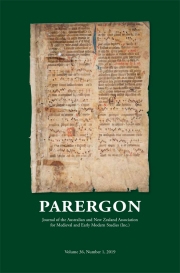The organisers invite paper proposals for the 2020 Leeds International Congress Leeds on the theme of ‘Beyond ‘Virgin’ Lands: Interdisciplinary Approaches to Gendered Landscapes’.
Interactions with the medieval landscape often appear as innately masculine. From Brutus’ foundation of the eponymous Britain to patrilineages derived from castle names to metaphorically feminine (virginal and untamed) lands awaiting male domination. Yet, as recent research shows, the apparent prevalence of these ‘fantasies’ in medieval sources is due in part to modern assumptions. In fact, historical women built castles and were patrons of monasteries, the legendary Syrian princess Albina gave her name to Albion before Brutus ever landed, female saints impressed their footprints permanently into rock and the menstrual blood of Queen Medh carved furrows into the Irish landscape. In symbolic, nominal, architectural, horticultural and legal ways, to name a few, medieval women shaped, curated and cared for the medieval landscape. Then as now, the landscape is a cultural construct: the ways we understand it have much to do with the gendered preconceptions and approaches we bring to our study and the sources and interactions we privilege.
These interdisciplinary panel(s) will explore the ways women, other gendered identities and non-human agents, both historical and representational, took control of and shaped geographical landscapes at a variety of scales. We are particularly interested in papers that move beyond artificial borders between male/female, nature/culture, domestic/political and other oppositional understandings. Questions may include but are not limited to:
- How did women’s political, communal and private interests influence the ways medieval
people understood their contemporary landscapes? To what extent did legends and
landmarks left by women shape future notions of the land’s identity? - In what ways did women’s devotional practices draw on landscapes at both micro and
macro levels? What haptic, emotional, affective experiences can we understand from
today? - What impact do masculine and paternalistic narratives have within the current
discourses on medieval landscapes, particularly in heritage studies? - What can we as scholars do to understand the diversity of class, gender, religious, racial
and cultural positions always at play within the medieval landscape? How does eco-
criticism and new materialism help in this study?
We hope these will be truly interdisciplinary discussions and welcome papers from all fields, including anthropology, archaeology, heritage studies, history, art history, literature and religion on any medieval period and geographical region.
Please submit an abstract of 150-200 words to Emma Bérat emmaberat84@gmail.com and Karen Dempsey k.dempsey@reading.ac.uk by 15 September 2019.

